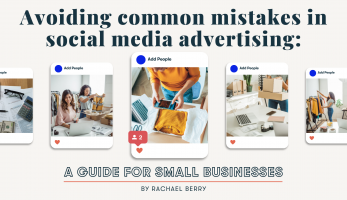Want to find out more about the future of social media advertising?
What is the future of social media advertising?
Powered by AI
AI is reshaping the way we interact and connect online and is going to completely transform our social media landscape over the next few years (some people have even likened it to when smart phones first came to market).
AI and social media go hand in hand to improve marketing operations and provide a better user experience.
As AI evolves, it will become even more valuable in the world of social media advertising from content creation and customisation to influencer marketing and ad monitoring.
Businesses will be able to get more value and engagement from their social media advertising and transform how they market across their social platforms.
Personalization will take centre stage, driven by the power of artificial intelligence (AI). Platforms will leverage user data, preferences, and behaviours to deliver hyper-targeted ads that resonate with individuals on a deeper level.
Small businesses should prepare by focusing on collecting and analysing customer data, creating detailed buyer personas, and investing in AI-powered tools to enhance their advertising campaigns.
By tailoring their messages to specific segments and individuals, small businesses can maximize their ad spend and achieve higher conversion rates.
Rise of Immersive Experiences
The future of social media advertising will witness the rise of immersive experiences, with technologies like augmented reality (AR) and virtual reality (VR) taking centre stage.
These emerging technologies have the potential to revolutionize the way brands engage with their audiences, creating interactive and memorable experiences that go beyond traditional ad formats.
Small businesses should prepare for this shift by exploring the possibilities of AR and VR and incorporating them into their advertising strategies.
Augmented Reality (AR) is a technology that overlays digital information and virtual elements onto the real world, enhancing the user’s perception and interaction with their surroundings.
It allows users to visualize products in their own environment, try on virtual clothing, or even experience immersive storytelling.
Small businesses can leverage AR in their social media advertising by creating AR filters, effects, or try-on experiences.
By offering interactive and engaging AR experiences, brands can capture the attention of their audience, increase brand awareness, and drive conversions.
Virtual Reality (VR), on the other hand, offers users a fully immersive digital experience, transporting them to a simulated environment through the use of a VR headset.
While VR has predominantly been associated with gaming and entertainment, its potential in advertising is immense. Small businesses can explore VR by creating virtual showrooms, 360-degree product demonstrations, or even virtual tours of their physical locations.
By providing customers with a realistic and immersive experience, brands can enhance engagement, inspire emotional connections, and differentiate themselves from competitors.
It’s important to note that while AR and VR hold tremendous potential, they should be implemented strategically and with purpose.
Small businesses should focus on delivering value to their audience through immersive experiences, ensuring that these technologies enhance the user experience rather than being gimmicky or distracting.
By offering meaningful and relevant experiences, brands can forge deeper connections, leave a lasting impression, and drive customer loyalty.
Embracing Authentic Influencer Marketing
Influencer marketing will continue to be a powerful tool for brands to connect with their target audience.
However, there will be a significant shift towards authenticity and genuine connections between influencers and their followers.
Audiences are becoming more discerning, developing a keen eye for overly polished and staged content that lacks credibility.
To prepare for this shift, small businesses should conduct thorough research to identify influencers who align with their brand values and target demographics.
They should consider factors such as an influencer’s content style, voice, and audience engagement.
By aligning with influencers who genuinely believe in their products or services, small businesses can ensure that endorsements are authentic and trustworthy.
Small businesses should also encourage influencers to provide honest and transparent feedback about their products or services.
This transparency fosters trust between the influencer and their audience, as well as between the brand and its potential customers.
Authenticity should be the guiding principle, with both parties ensuring that the influencer’s content remains genuine, even when promoting products.
Building long-term partnerships with these influencers can yield higher engagement and establish credibility among the audience.
Social Responsibility and Purpose-driven Advertising
As consumers become more conscious of social and environmental issues, the future of social media advertising will see a significant emphasis on social responsibility and purpose-driven campaigns.
In this evolving landscape, small businesses should prepare by aligning their values with causes that resonate with their target audience, integrating social responsibility into their brand identity, and communicating their commitment authentically.
Incorporating social responsibility into advertising campaigns requires a thoughtful approach.
Small businesses should ensure that their messaging reflects their commitment to the cause in an authentic and genuine manner.
Rather than simply using social issues as marketing hooks, they should demonstrate a true understanding of the problem and present concrete solutions or actions that they are taking to make a difference.
This approach builds trust and resonates with socially conscious consumers.
It’s important to note that purpose-driven advertising should not be seen as a short-term trend but as an ongoing commitment.
Small businesses should continuously evaluate and evolve their social responsibility efforts based on changing needs and feedback from their audience.
By consistently demonstrating their dedication to social causes, small businesses can cultivate long-term relationships with customers who appreciate and support their purpose-driven initiatives.
By communicating their commitment to social and environmental causes authentically, small businesses can build trust and loyalty among their customers.
Integrating purpose into their advertising strategies can not only boost brand reputation but also attract a growing segment of socially conscious consumers.
How much does social media advertising cost?
The cost of social media advertising can vary significantly depending on several factors.
First and foremost, the platform you choose plays a crucial role in determining the cost. Popular platforms like Facebook, Instagram, Twitter, and LinkedIn offer various advertising options with different pricing structures. Additionally, factors such as the size and reach of your target audience, the duration and frequency of your campaign, the ad format you choose (e.g., image, video, carousel), and the level of competition within your industry can all impact the cost.
Furthermore, social media advertising costs are often influenced by bidding mechanisms, where advertisers compete for ad placements, and the demand for specific targeting options.
It’s essential for businesses to carefully plan their budget and set clear objectives to optimize their ad spend and achieve the desired results while keeping an eye on the evolving cost dynamics of social media advertising.
Small businesses should also consider investing in a social media advertising company to maximize their potential for success in the digital landscape. While managing social media advertising campaigns in-house may seem feasible, partnering with a specialized agency offers distinct advantages and can provide strategic guidance tailored to a business’s unique goals and target audience.
Conclusion
As we conclude our exploration into the future of social media advertising, we find ourselves standing at the precipice of a dynamic and transformative era.
In this rapidly evolving landscape, small businesses must be proactive, adaptable, and forward-thinking. They should embrace technological advancements, leverage data-driven insights, and stay attuned to the ever-changing needs and expectations of their target audience. By aligning their strategies with the pulse of the future, small businesses can position themselves as trailblazers, forging new paths to success in the realm of social media advertising.
Together, we can shape a future where social media advertising transcends its boundaries, amplifies voices, and paves the way for meaningful and impactful interactions between businesses and their audiences. The possibilities are boundless, and the future beckons. It’s time to embrace it, seize it, and thrive within it.
Ready to explore social media advertising?




